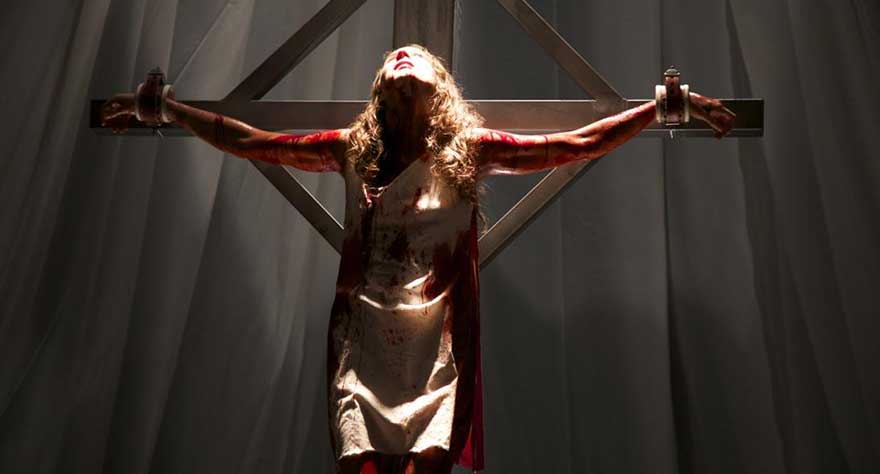
A remake whose irrelevance dominates every frame.

A remake whose irrelevance dominates every frame.
It’s hard to believe it’s been almost a decade since the New French Extremity—a group of French genre films united by, to put it simply, a lot of disgusting gore—exploded with titles like Frontier(s), Inside, and Sheitan coming out over a short time span. In 2008, the movement reached its peak with Martyrs, Pascal Laugier’s controversial take on martyrdom that had people fleeing for the exits. Martyrs has gained a strong following since it came out, partly because of how it transcends the expectations of an exploitation film. It’s a film that shows women being systematically tortured, but labeling it as “torture porn” would be wrong. Laugier examined the meaning of being a martyr, along with the connection between immense suffering and transcendence through pain. Martyrs stuck out not just because of its gore; it was a philosophical horror film, one with significant ambitions that combined intellectual themes and the kind of horrifying content associated with the lowest common denominator. Even the film’s harshest critics couldn’t deny that Laugier, despite his methods, was trying to say something.
So what happens when US filmmakers take Laugier’s work and adapt it for English-speaking audiences? After several false starts, this new Martyrs has finally come to fruition via the help of directors Kevin and Michael Goetz, The Revenant screenwriter Mark L. Smith, and horror “it” producer Jason Blum. Blumhouse, the production company responsible for the Paranormal Activity and Insidious franchises, is known for its successful approach to making horror films: make a film for a low budget, then have major studios pick up and release them. It’s a successful model because it takes advantage of horror’s self-generating interest (genre films don’t need big stars to attract moviegoers) while providing big profits given the low production cost. That is, in a nutshell, the model behind multiple horror success stories over the past several years, including films like The Purge and Sinister.
Blumhouse has tweaked and perfected a micro-budget machine, and as much as the company can tout its increased creative control or ability to produce outside of the studio system, it’s still a machine. Laugier handled writing and directing duties on the original Martyrs, and it’s obvious that it’s a film with his individual stamp on it. With the remake, the Goetz brothers and Smith transplant Laugier’s work to a format more focused on quick returns and basic thrills, a change that’s like shoving a square peg into a round hole. The set-up is more or less identical to Laugier’s film: Lucie (Troian Bellisario) claims she was kidnapped and tortured by a group of people as a child before escaping, although police found no evidence backing up her story. Fifteen years after escaping, Lucie finally tracks down her kidnappers—a seemingly ordinary couple with two teenage children—and ruthlessly slaughters them in their own home. She calls on Anna (Bailey Noble), her best friend growing up at the orphanage, to help her remove the bodies, although Anna starts doubting Lucie’s sanity given she just gunned down a family without remorse (fair warning: those unfamiliar with either version of Martyrs should stop reading here unless they want to be spoiled).
Since this is a horror movie, Lucie’s claims turn out to be true. The people she killed did, in fact, torture her as a child, and Anna soon discovers they were part of a cult dedicated to creating martyrs in an attempt to understand what lies in the afterlife. Smith’s screenplay, in what some might point to as a true example of what “Americanizing” something means, dumbs things down to make the religious themes impossible to miss, whether it’s having the cult’s leader (Kate Burton) spell everything out or using the image of a woman burning at the stake. At the very least, Smith does try to change things up from Laugier’s original screenplay in the latter half, honing in on Anna and Lucie’s friendship instead of the barbaric plot they’ve become a part of. But that focus only muddles the thematic content that made up the backbone of Laugier’s film, and Smith makes no efforts to adjust the rest of the source material to his changes.
What Martyrs amounts to is a cheap mess, an attempt to adapt a work more focused on ideas into something designed to provide thrills and action, and the clash between the two modes is an ugly one. The Goetz brothers, try as they might to claim they’re doing their own spin on the original, settle into what feels like a shot for shot remake; the punishing final act of Laugier’s film, designed to make its climactic moment of transcendence all the more powerful, gets replaced by a vengeance-fueled firefight instead; the violence gets toned down significantly, a choice that could have worked had it not reeked of the producers trying to ensure they’d get an R rating; and the ending tries to maintain the original’s ambiguity while tying up Anna and Lucie’s storyline in a way that betrays the film’s own themes. Martyrs is nothing more than a complete waste of time, a remake whose own irrelevance dominates every frame. Rather than try to respect the original content beyond its gory surface, Martyrs prefers to trace over its more violent moments, cherry picking what it needs to make something more inclined to entertain than provoke. Unlike Laugier’s unforgettable film, it’s best to forget this version of Martyrs ever happened.